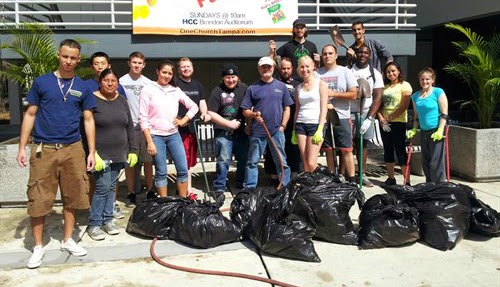campuses and programs more” green”, the number of staff positions (including coordinators, managers, directors, and chief sustainability officers), dedicated to college sustainability efforts and programs is also growing. Colleges however, do still lag far behind universities in terms of numbers of full-time positions focused on sustainability. Results of the Association for the Advancement of Sustainability in Higher Education’s (AASHE) July 2013 “Salaries & Status of Sustainability Staff in Higher Education” report, shows an increase in University positions from 74% in 2010 to 85% in 2012.
ASHEE’s report also shows that although campus sustainability positions are relatively new within higher education, numbers are rising (this report includes Florida colleges and universities). The newness of sustainability positions can be reflected in the finding that nearly 90% of respondents have been in their current positions for five years or less. Nearly half of all respondents in 2012 were in positions created or upgraded since 2010, indicating significant growth for sustainability positions in recent years. The shift toward sustainability is clear and the increasing number of staff sustainability positions is a powerful visual indicator of this shift.
In October 2014, FLATE conducted an informal survey of college sustainability staffing and sustainability-related programs. According to the survey, of the 28 state and community colleges (with 68 campuses and 178 sites) in Florida, only two (Valencia Community College and Hillsborough Community College) have dedicated, paid sustainability positions (Director of Sustainability and Sustainability Coordinator respectively). VCC’s Office of Sustainability was established in November 2011 within the Facilities department and HCC’s Sustainability Council was established in 2009 with the coordinator position added in 2011. Other colleges have staff that carry out sustainability-related tasks such as recycling and energy efficiency measures, but these individuals are usually facilities/operations maintenance and management staff members. Sustainability-related tasks are only a small part of their positions’ responsibilities.
Without fail, all of Florida’s colleges have active student sustainability, green and/or environmental
 |
| Sustainability staff (usually coordinators) often drive volunteer |
clubs and groups dedicated to sustainability causes and educating fellow students, staff and the community about the importance of sustainability. All colleges have recycling programs and many have ridership programs to encourage students to carpool and lessen their impact on the environment, while at the same time saving money. Energy-saving practices and measures are the norm on college campuses. Eight of Florida’s colleges have Leadership in Energy and Environmental Design (LEED)-certified buildings (which promote energy efficiency, human and environmental health, and sustainable site development, among other features), and many of those that do not are planning new buildings to meet LEED standards. Seven are members of ASHEE and 12 are members of Sustainability Education and Economic Development (SEED). Many colleges have received sustainability-related awards including Hillsborough Community College. HCC was selected as “Overall Winner” of the American Association of Community College’s (AACC) Inaugural Green Genome Awards in 2012. The award is designed to identify and honor community colleges who have taken strong strategic leadership roles promoting sustainability, and green workforce development throughout their institution and community as a whole.
Creation off-campus sustainability offices are becoming increasingly more common in colleges and universities as sustainability careers continue to increase and evolve. In AASHE’s July 2013 report, survey responses showed that 67% of 2012 respondents indicated that their positions were housed in a sustainability office, compared to just 23% in 2010. Higher education sustainability-focused job announcements presented in the AASHE Bulletin in 2013, increased by 34% from 2012, supporting the upward trend in dedicated positions reported in the 2013 report. There are significant opportunities for continued growth in state and community colleges’ sustainability staffing moving into the future, and buy-in and commitment from campus administration is essential for these positions to become a reality. Some sample positions and descriptions include:
- Sustainability Positions – Job Description Examples: https://www.aashe.org/resources/example-job-descriptions
- Association for the Advancement of Sustainability in Higher Education (AASHE’s) July 2013 “Salaries & Status of Sustainability Staff in Higher Education” report
For more information on sustainability efforts, programs and staffing at Florida Colleges visit https://fl-ate.org/projects/fesc.html, or contact Nina Stokes, FLATE-FESC project manager at stokes@fl-ate.org/813.259.6587.
Terms of Use | Privacy Statement
Copyright © 2024 All Rights Reserved
























